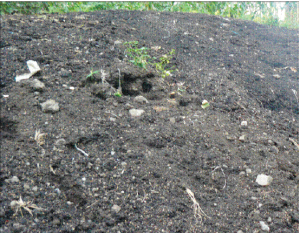The Up-cycling Project team’s mission is to work with farmers to maximize their crop yields despite dramatic fluctuations in rainfall throughout the year. One rainwater harvesting technique is mulching. Mulching is the process of covering the soil to avoid water loss through evaporation. Some key principles of mulching include using materials void of seeds (they will germinate to weeds and eventually compete for nutrients with the crops) and disease and making sure the materials are moist.
Coffee pulp is an ideal mulching material because it protects the soil from erosion. It is most valuable when composted with other forms of humus before used in the farm. If used fresh, it emits a level of heat and gas which can be harmful to plants. Allowing pulp to fully decompose before fertilizing not only mitigates the heat and gas danger, but it also helps to kill any existing pathogens. Additionally, the chemical make-up of mulch ( 1.7% nitrogen, 0.05% phosphorous, 1.06% potassium) plus increased concentrations of calcium, and magnesium help reduce soil acidity. An added benefit is that using coffee pulp for crops helps reduce coffee waste in the environment.
On June 26th, 2012 the Up‐cycling team paid a visit to a Northern Tanzanian coffee farmer, Mr. Philemon Nnko. He has two plots of corn and beans; rocks and stones dominate one plot. The second plot has soil which appears ideal for farming. The rocky plot had been composted using coffee pulp.

Despite the rockiness of the soil, the crops in the second plot are green and healthy. “Certainly I will harvest a lot from this plot,” remarked Mr. Nnko. In contrast, the un-mulched plot looks debilitated. The crop is yellow, signaling dehydration and lack of nutrients.
With the benefits of coffee pulp mulching so visibly clear, Mr. Nnko invited his fellow members of the Pendo Cooperative to his farm and to hear more about the benefits of up-cycling. Always interested in methods for increasing yield, the other farmers enthused to learn more about the innovative technique.
Written by Mallory Dawson, 2012 Summer Fellow



.png)
